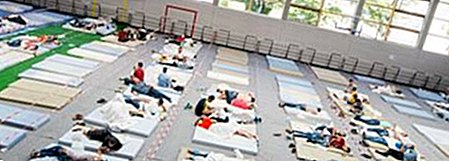What can I do specifically to help refugees?

Everything is getting scarce: accommodations, sanitary facilities, helpers ...
The refugee situation is dramatic. "More people fled last year than ever since we started our records," said United Nations High Commissioner for Refugees, Antonio Guterres. More than 60 million people worldwide have lost their homes. In 2015, instead of the predicted 450,000, the federal government now expects up to 750,000 asylum seekers. Everything is scarce: areas, accommodations, sanitary facilities, helpers.
... although the helpfulness is huge
The dramatic situation is causing not only right-wing and extreme right-wing extremists to stir up fears and hatred in the population, but luckily also a lot of helpers who want to make life easier for the refugees - with German language courses, donations in kind, games for the children, translation services, attention and time. Everywhere initiatives are set up, often before the needy ever move into the accommodation.
"The helpfulness and hospitality in the population are unlikely high," Birte Vogel tells us. In her free time, she runs the very informative How-Can-I-Blog, where she lists refugee initiatives across Germany and provides lots of links and information. She says that by far the most searches on her blog were about the topic of housing refugees privately. "Obviously a lot of people are interested in it nationwide."
Helping hands and donations are still needed
Despite the great commitment, helping hands and donations are needed everywhere. In Hamburg, for example, more than 1,000 refugees have recently moved temporarily to the exhibition halls. Still missing things like toothbrushes, shower gel, shampoo, bandages, diapers and tampons. Helpers posted a call on Facebook asking them to donate such products. But how do you find out, what is needed right now?
What exactly do people need?
In most cases, your help and donations. You need people who teach the newcomers some German, help sorting donated clothing, organize cultural visits and visits to authorities, or provide translation services. If you would like to donate clothes, toiletries or toys, please always inquire at the accommodation, the local authorities or local initiatives what is really needed. And please wash and sort your well-preserved clothes before you bring them.
Where can I find out how to help near me?
Unfortunately, there is no blanket valid answer. Each municipality works differently and that's why a small amount of research is often needed. A great first stop is the already mentioned above blog how-can-I-help by Birte Vogel. Or you can contact the Public Order Office, the local Caritas, the Diaconal Ministry, your parish, the Red Cross, or a volunteer agency near you. There are also many Facebook groups that provide information on what is needed locally.
I want to help a refugee or a family to get used to it. How does it work?
In many places, there are initiatives that volunteer to take care of the needs of the refugees and provide sponsorships. As godfather or godmother you are the contact person for a person or a whole family. You are there for the people when they need help abroad - when it comes to finding a suitable doctor, buying a light bulb or understanding German.
Rooms vacant? If you want to take in a refugee with you
Everything is better than an isolated, anonymous mass camp. You have a spare room in your flat or shared flat or do you know about other accommodation? The association "Mensch Mensch Mensch e.V." bring together refugees who you can take up. At www.fluechtlinge-willkommen.de you will find the support you need. The association also helps with the financing of the rent. Some federal states pay the costs of private accommodation.
You want to be there for underage refugees?
More and more underage unaccompanied refugees arrive in Germany who have no one to look after them. If you are interested in a private guardianship, you best turn to the national and local associations of the German Child Protection Association e.V. or the Youth Welfare Office. A private guardian takes time for the uprooted youths, listens to them and helps them find their way around our culture. Although minors always have a guardianship, but the cared for up to 50 minors at the same time and can not enter into a personal relationship with a ward.










